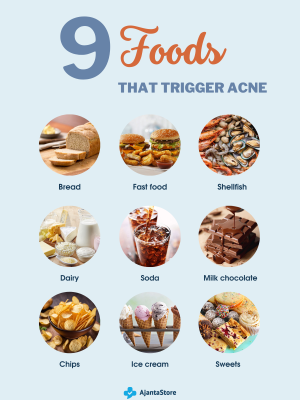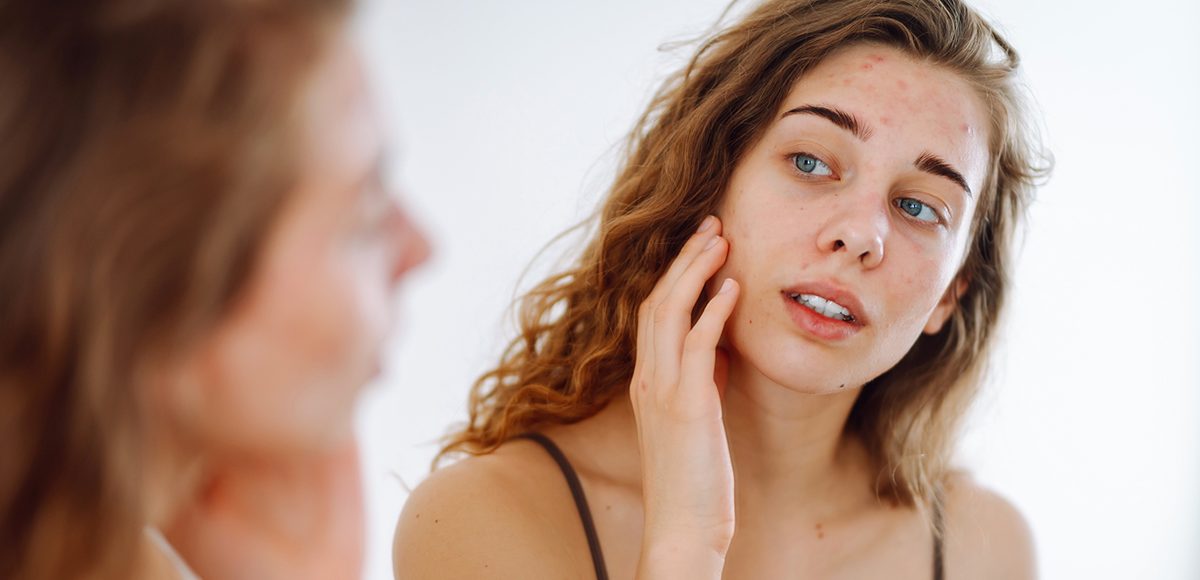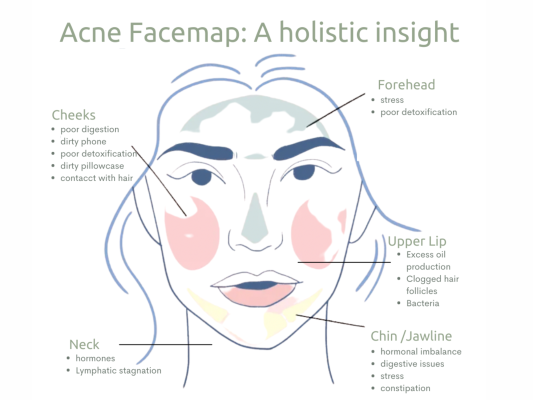Why Is My Skin Breaking Out: 10 Causes of Acne
Skin breakouts can be frustrating, impacting not only your appearance but also your confidence. Understanding the reasons behind acne and how to treat it can help you achieve clearer skin. In this article, we’ll explore 10 common causes of acne, specific breakout locations and effective treatments available for purchase online. Whether you’re looking to buy acne treatments online or seeking practical solutions, we’ve got you covered.
Common Causes of Skin Breakouts
Understanding the causes of spots on your face is crucial for effective treatment. Here are the top ten reasons why you may be experiencing breakouts:
1. Hormonal Changes
Hormonal fluctuations are one of the most significant triggers for acne. These changes often occur during puberty, menstruation, pregnancy or even when starting or stopping hormonal contraceptives. The increase in hormones, particularly androgens, leads to an increase in sebum (oil) production, which can clog pores and lead to breakouts. Managing hormonal acne often requires a multi-faceted approach, including lifestyle adjustments and appropriate treatments.
2. Diet and Nutrition
 The food you consume plays a critical role in skin health. Diets high in sugar, refined carbohydrates, and dairy products have been linked to increased acne flare-ups. Foods that cause rapid spikes in blood sugar can lead to inflammation and, consequently, acne. On the other hand, a diet rich in whole foods, such as fruits, vegetables and healthy fats, can promote clearer skin. It may be beneficial to keep a food diary to identify any potential triggers related to your diet.
The food you consume plays a critical role in skin health. Diets high in sugar, refined carbohydrates, and dairy products have been linked to increased acne flare-ups. Foods that cause rapid spikes in blood sugar can lead to inflammation and, consequently, acne. On the other hand, a diet rich in whole foods, such as fruits, vegetables and healthy fats, can promote clearer skin. It may be beneficial to keep a food diary to identify any potential triggers related to your diet.
3. Stress and Anxiety
Stress is not just a mental concern; it can manifest physically, particularly on your skin. When you’re stressed, your body releases cortisol and other hormones that stimulate oil production in your skin glands. This can result in clogged pores and, ultimately, breakouts. Finding effective ways to manage stress – such as mindfulness practices, regular exercise, or engaging in hobbies -can significantly benefit your skin.
4. Skincare Products
Using the wrong skincare products can be detrimental to your skin health. Many creams, lotions and makeup contain ingredients that are comedogenic, meaning they can clog pores. For example, heavy oils and certain silicones can exacerbate acne. It’s essential to choose products labeled as non-comedogenic and tailored to your skin type. Always read ingredient labels to ensure you’re using skin-friendly formulations.
5. Environmental Factors
Pollution, humidity and even climate changes can contribute to skin irritation and breakouts. Pollutants can settle on your skin, leading to inflammation and clogged pores. Additionally, humidity can increase sweat and oil production, making it easier for bacteria to thrive. Regular cleansing can help remove impurities and reduce breakouts.
6. Poor Hygiene
Inadequate skincare routines can lead to breakouts. If you don’t wash your face regularly, especially after sweating or wearing makeup, dirt and oil can accumulate on your skin, clogging pores. It’s essential to establish a consistent skincare routine that includes cleansing, exfoliating and moisturizing to maintain skin health. Make sure to wash your pillowcases and towels frequently, as they can harbor bacteria that contribute to acne.
7. Medications
Certain medications can have side effects that include acne. For instance, steroids and some hormonal medications can lead to increased oil production and clogged pores. If you suspect that your medication is causing your skin issues, consult your healthcare provider to discuss alternatives or solutions that might be less irritating to your skin.
8. Genetics
Genetics also play a crucial role in your susceptibility to acne. If your parents had acne, you might be more likely to experience it as well. Understanding your family history can help you anticipate and manage breakouts more effectively. If acne runs in your family, proactive measures, such as regular skincare and consulting a dermatologist, can be beneficial.
9. Sleep Deprivation
Lack of sleep can significantly impact your skin’s health. When you’re sleep-deprived, your body produces more cortisol, which can increase oil production and lead to breakouts. Furthermore, inadequate rest can slow down skin repair and regeneration, making your skin more prone to issues. Aim for 7-9 hours of quality sleep each night to promote overall skin health.
10. Allergies and Sensitivities
Reactions to certain skincare products, cosmetics, or even foods can manifest as acne. If you have allergies or sensitivities, they may lead to inflammation, redness, and breakouts. Identifying and avoiding these allergens is essential. Consider patch testing new products before widespread use and maintain a healthy diet to help reduce potential allergic reactions.
Acne Face Map: Causes of Breakouts
Understanding where breakouts occur can help tailor your approach to treatment. Breakouts on the forehead are often linked to dietary choices and stress, while those on the cheeks may be associated with environmental pollutants and touching the face. Chin and jawline breakouts are frequently caused by hormonal changes, particularly in women, and can worsen with facial touching. Nose breakouts typically result from excess oil and clogged pores, while body acne on the back and shoulders is often due to sweat, friction from clothing and product residue.
By recognizing the specific areas of your face or body affected by acne, you can better target your treatments and skincare products to address these concerns.
How To Treat Breakouts
Once you understand the causes of pimples on cheeks and other areas, you can take action to treat them effectively. Here are several options for treating breakouts, including some you can buy online:
Over-the-Counter Treatments
Over-the-counter (OTC) treatments can provide immediate relief for mild to moderate acne. Here are some effective options:
- Benzoyl Peroxide: This is one of the most widely used ingredients for acne treatment. It works by killing acne-causing bacteria and reducing oil production. Benzoyl peroxide is available in various concentrations, allowing you to choose one that suits your skin type. For those looking for specific formulations, Perobar soap combines benzoyl peroxide with other skin-soothing ingredients to enhance effectiveness while minimizing irritation. Similarly, Peroduo Gel features a combination of benzoyl peroxide and adapalene, a topical retinoid that unclogs pores and reduces inflammation. This dual action makes Peroduo particularly effective for treating stubborn acne.
- Salicylic Acid: An excellent option for unclogging pores, salicylic acid helps exfoliate the skin and reduce inflammation. It penetrates deep into the pores, making it effective for treating blackheads and whiteheads.
- Glycolic Acid:This alpha hydroxy acid (AHA) promotes exfoliation and helps improve skin texture, making it beneficial for preventing future breakouts.
- Isotroin Tablets: These oral medications contain isotretinoin, which is effective for severe acne that hasn’t responded to other treatments. However, these should be taken under the guidance of a healthcare provider due to potential side effects.
AjantaStore offers Isotroin tablets in various dosages to suit your specific needs for effective acne treatment. Whether you require a lower dose for mild acne or a higher dose for more severe cases, we have the right option for you. Check them out now at AjantaStore and find the perfect dosage for your skincare!
Prescription Medications
If OTC treatments don’t yield results, prescription options may be necessary. Consult your healthcare provider for personalized recommendations. Common prescription treatments include:
- Topical Retinoids: These vitamin A derivatives help unclog pores and promote cell turnover, making them effective for treating acne.
- Oral Antibiotics: Medications like doxycycline or minocycline reduce inflammation and bacteria in moderate to severe acne cases.
- Hormonal Treatments: For women, birth control pills can help regulate hormonal fluctuations that lead to acne.
Professional Treatments
For persistent or severe acne, professional treatments may be necessary. Dermatologists can provide tailored therapies, including:
- Chemical Peels: These treatments use acidic solutions to exfoliate and improve skin texture while reducing acne.
- Laser Therapy: This advanced option targets bacteria and reduces oil production, helping to improve acne severity.
- Microdermabrasion: A non-invasive procedure that exfoliates the skin, helping to clear clogged pores and improve overall skin appearance.
Looking for more ways to keep your skin clear? Check out our expert tips on How to avoid acne breakouts and take control of your skin’s health today!
Home Remedies
In addition to commercial treatments, several home remedies can help reduce acne:
- Tea tree oil: Known for its antimicrobial properties, this essential oil can be applied to individual pimples to help reduce their size and redness.
- Honey: With natural antibacterial properties, honey can soothe irritated skin and may help heal acne.
- Green tea: Rich in antioxidants, green tea can be applied topically or consumed to help reduce inflammation and promote overall skin health.
- Aloe Vera: Known for its soothing and anti-inflammatory properties, aloe vera can help reduce redness and irritation while promoting healing in acne-prone skin.
- Apple cider vinegar: With its antibacterial and pH-balancing qualities, apple cider vinegar can help combat acne-causing bacteria and improve overall skin texture when used as a diluted toner.
Skincare Routine Adjustments
A consistent skincare routine is vital for managing acne:
- Cleansing: Use a gentle cleanser twice daily to remove excess oil and dirt.
- Moisturizing: Hydrate your skin with a lightweight, non-comedogenic moisturizer that won’t clog pores.
- Exfoliating: Exfoliate 1-2 times a week to remove dead skin cells and prevent clogged pores.
Want to learn more about how benzoyl peroxide can help clear your skin? Explore our article, “How Does Benzoyl Peroxide Work for Acne,” to discover its mechanisms, benefits, and tips for effective use!
FAQs
1. Does moisturizer help acne?
Yes, using a non-comedogenic moisturizer can hydrate the skin without clogging pores.
2. How do you prevent spots?
Maintain a consistent skincare routine, eat a balanced diet, and manage stress levels.
3. How to get rid of forehead pimples?
Use targeted treatments like salicylic acid, keep hair products off your forehead and maintain cleanliness.
4. What causes acne on the face?
Acne is often caused by hormonal changes, diet, stress, and improper skincare routines.
5. Does sweat give you pimples?
Sweat can mix with oils and dirt on your skin, leading to clogged pores and breakouts.
6. Can makeup cause breakouts?
Certain makeup products can clog pores if they contain comedogenic ingredients. Always choose non-comedogenic makeup.
7. How to treat sudden face breakouts?
Start with an effective spot treatment, keep your skin clean and avoid touching your face.
8. Can moisturizer cause spots?
If it’s comedogenic, yes. Always choose non-comedogenic moisturizers to prevent breakouts.
9. How to dry out a pimple?
Use spot treatments containing benzoyl peroxide or salicylic acid to help dry out the pimple and reduce inflammation.
Skin breakouts are manageable when you understand their causes and how to treat them. By identifying triggers, utilizing effective treatments and adopting a suitable skincare routine, you can work towards clearer skin. Remember to explore options for buying acne treatments online, and consider products like Perobar soap, Peroduo Gel and Isotroin Tablets, which are available at AjantaStore.
Take control of your skin today! Explore our wide range of effective acne treatments available at AjantaStore. Start your journey to clearer skin and feel confident once again!









